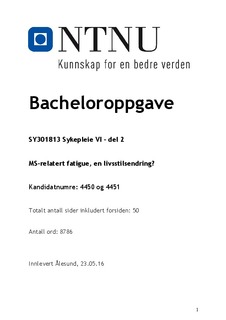| dc.contributor.advisor | Skår, Janne-Rita | |
| dc.contributor.author | Olsvik, Kamilla | |
| dc.contributor.author | Flem, Ingrid | |
| dc.date.accessioned | 2016-10-14T10:52:59Z | |
| dc.date.available | 2016-10-14T10:52:59Z | |
| dc.date.issued | 2016 | |
| dc.identifier.uri | http://hdl.handle.net/11250/2415208 | |
| dc.description.abstract | Hensikt: I denne studien ønsker vi å belyse hvilke erfaringer pasienter med MS har med fatique, og hvordan de mestrer utfordringer knyttet til symptomet. | nb_NO |
| dc.description.abstract | Metode: Dette er en systematisk litteraturstudie basert på åtte forskningsartikler, syv kvalitative artikler og en review-artikkel. | nb_NO |
| dc.description.abstract | Resultat: Fatique er et av de mest plagsomme symptomene ved MS. Det fører til at pasientene lever et strukturert liv, hvor planlegging, prioritering og kompromisser preger hverdagen, og behovet for kontroll er sentralt. Fysisk aktivitet kan bidra til fysiske, psykiske og sosiale goder, men samtidig kan det øke stress og forverre graden av fatique. Pasientene har et stort behov for informasjon og føler at dette mangler fra helsepersonell sin side. Lite kunnskap fører til bekymring og forvirring, og pasientene må selv innhente informasjon for å mestre fatique. | nb_NO |
| dc.description.abstract | Konklusjon: Erfaringene med fatique er gjerne subjektive, og det som virker hos en pasient, virker nødvendigvis ikke hos den andre. Mestring av fatique er også subjektivt, og pasientene finner egne måter å mestre utfordringene symptomet gir. Sykepleiere må tilrettelegge tilbud til den enkeltes behov og ressurser, og an individuell plan kan være et godt hjelpemiddel. | nb_NO |
| dc.description.abstract | *** | nb_NO |
| dc.description.abstract | Purpose: The purpose of this study is to illuminate the experiences of fatique among patients with MS, and how they are able to manage the challanges fatique brings. | nb_NO |
| dc.description.abstract | Method: This is a systematic literature review/study based on eight research articles, seven qualitative articles and one review-article. | nb_NO |
| dc.description.abstract | Results: Fatique is one of the most exhausting symptoms with Multiple Sclerosis. It causes a structured life for the patients, where planning, prioritizing and compromise characterize the everyday life, and the feeling of control is important. Physical activity can give the patients physical, psychological and social benefits, but in the same time it can increase stress and exacerbate fatique. The patients have a great need for information about the symptom, and feel that this is a lack from the healthcare. Little knowledge leads to concern and confusion, and the patients must obtain information to master fatique. | nb_NO |
| dc.description.abstract | Conclusion: The patients experiences of fatique are often subjective. What helps one person manage the symptom, doesn't necessarily help another. Coping with fatique are also subjective and a way of coping is that the patients find their own way to cope with the challeges the symptom provides. Nurses must facilitate service to each patients needs and resources, and an individual plan can be a good tool in the process. | nb_NO |
| dc.language.iso | nob | nb_NO |
| dc.rights | Navngivelse-Ikkekommersiell-IngenBearbeidelse 3.0 Norge | * |
| dc.rights.uri | http://creativecommons.org/licenses/by-nc-nd/3.0/no/ | * |
| dc.subject | MS: Multiple Sclerosis | nb_NO |
| dc.subject | Fatique | nb_NO |
| dc.subject | Pasienter med MS | nb_NO |
| dc.title | MS-relatert fatique, en livsstilsendring? | nb_NO |
| dc.type | Bachelor thesis | nb_NO |
| dc.subject.nsi | VDP::Medical disciplines: 700 | nb_NO |
| dc.source.pagenumber | 50 | nb_NO |

